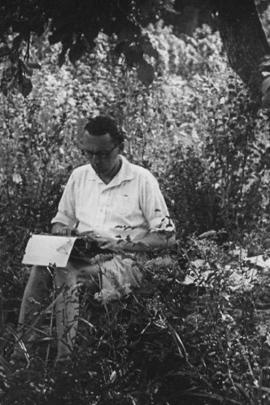
Istvan Bibo
István Bibó has been the greatest Hungarian democratic thinker of the Twentieth Century. Jurist, political scientist, essayist, scholar specialised in the problems of democracy in Hungary and Central Europe (The poverty of the small Central European States, 1946), he was a free spirit who had anticipated in his essays the subject of human, ethnic and social rights in Hungary. And yet Bibó was not only an excellent scholar of great historical erudition, but also an “ethical genius”, as one of his fellow students had described him in the Thirties of the last century.
A sworn foe of Nazi-fascism, in 1944 Bibó was arrested for providing some persecuted Jews with forged documents, and when he was released he had to go into hiding until the end of Second World War. Then, in his essay The Jewish question in Hungary, he was the first – and until now also the only one – to summon the Hungarian nation’s conscience to come to terms with its responsibilities for the persecution and murder of 600,000 (!) Hungarian Jews. And Bibó was a Calvinist, a believer...
He was also an inexorable critic of communism. He opposed the dictatorial tendencies of the communist party, and when, in 1949, the communists came on power, he lost his post as a university professor. Then, when the revolution broke out in 1956, Bibó got back to politics and accepted the position as State Minister in the government of Imre Nagy. On 4 November, when the Russian tanks invaded the country and sieged the Parliament, Bibó was the only government member not to leave his position and he wrote a proclamation entitled as Project for a compromise solution of the Hungarian question. The text was sent abroad, Bibó was arrested in 1957 and sentenced to life in jail for “spying activities aimed at overturning the people’s democratic government of Hungary” - i.e. the pro-Soviet government, imposed on the country by the means of brutal force by the Russian invaders.
For a long time after his release from jail thanks to an Amnesty law of 1963, Bibó was nearly forgotten. Only some friend kept in touch with him, including my father: they were great friends, close in their thought and imprisonment, they shared the same prison cell. My dad was in facts the chief of the press office of the Nagy government, sentenced to 5 years in jail for this.
Bibó came often to our home to exchange his views with my parents. Usually, these meetings took the form of long promenades, not for health reasons, but because we knew there were hidden microphones, “bugs” in various places of our flat, and thus it was dangerous to discuss political issues at home.
Then, in the Seventies, a group of young intellectuals, the so-called “dissidents” or members of the democratic opposition, rebels against the communist regime, rediscovered him and spread his writing in the form of samizdat – underground, cyclostyled editions. At that time Bibó became an emblem for a whole generation. His funeral in 1979 became a demonstration against the regime. In 1981 – over one year after his death – 76 intellectuals paid tribute to him with a book published by an underground publishing house, entitled as Book in memory of Bibó.
At the time of change in 1989, for a short time, different political parties tried to take possession of his spiritual heritage. They exploited him and quoted him based on their interests, but when they realised Bibó did not serve their political goals, they forgot about him very soon.
It’s a cruel irony of fate that Viktor Orbán, the current authoritarian, nationalist, sovereignist, anti-European prime minister, spent some youth years in the Bibó College, founded in 1985. He attended seminars, conferences, debates of renowned jurists, economists, sociologists, dissident philosophers on human rights, democracy, and the freedoms that today Orbán is systematically destroying with his illiberal democracy.
Today it is the István Bibó Civic Association that keeps alive the liberal spirit and democratic thought of Bibó. Founded in 2000, the Association is a public forum to discuss the current political, economic and social issues of the country. Besides spreading and popularizing Bibó’s work, the mission of the Association is that of promoting dialogue among democratic intellectuals who are greatly influential in the public. It thus organises conferences, debates open to the public, and every year it celebrates the proclamation of the Second Republic of Hungary of (the Second Republic ceased to exist when the communists seized the power in 1949 and the name of the country became Hungarian People’s Republic. In 1989, the Third Republic of Hungary was born, then in 2012 Orbán, changing the constitution, also changed the country’s name: Hungary, without Republic...).
To mark this celebration, the Bibó Association organizes a conference on the state of the Republic and assigns the István Bibó Prize for Democracy. This year, the prestigious award was bestowed on my sister, Mária Vásárhelyi, sociologist, relentless democracy, human rights and freedom fighter.
István Bibó was the embodiment of the democratic, liberal, tolerating and humanist thought. Men and women like him are very few in the history of Hungary.
Today he should set an example and be a figure of moral reference of democratic activists not only in Hungary but also all over Europe and the world.






